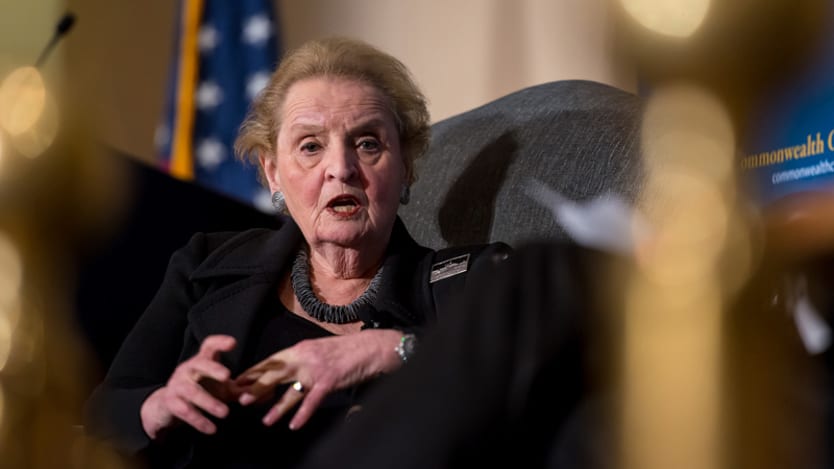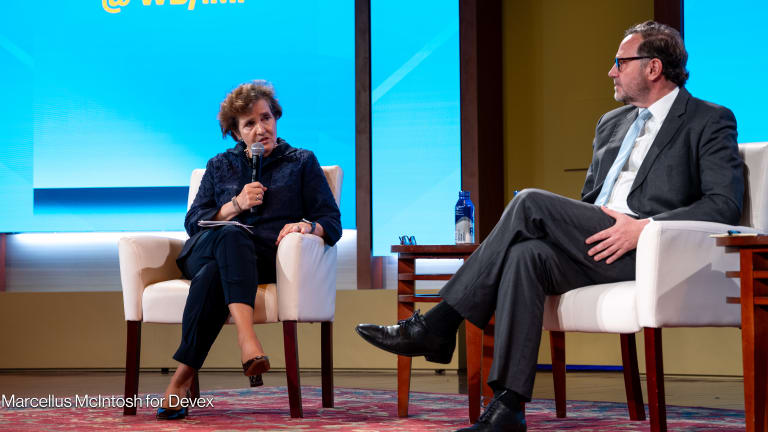Madeleine Albright on multilateralism, foreign aid reform, and the UN

WASHINGTON — Former Secretary of State Madeleine Albright led the United States Department of State during one of the last big efforts to reorganize of the U.S. Agency for International Development and the State Department, and the U.S. should heed some lessons from the past, she told Devex in an interview.
Many of the debates around aid and reform are not new, and Albright has seen them before in previous iterations. One of the last major pushes to merge USAID into the State Department came from Sen. Jesse Helms while Albright led the State Department, and there have always been some questions about the relationship between USAID and the secretary of state and how USAID programs fit into administration policy, Albright said.
“I personally believe in USAID … [but] there’s no reason that the development people and the policy people can't be on the same page frankly, in terms of what can be done,” she said.
“This administration somehow finds working with others as if it were a weakening of America, when it's actually a strengthening and force multiplier in so many ways.”
— Former Secretary of State Madeleine AlbrightDuring her time at the State Department, however, there were some tense moments with her good friend Brian Atwood, who was the USAID administrator at the time, about how much say she would have on the USAID budget. USAID wanted to be more independent, but Albright was interested in trying to determine how USAID programs fit into overall policy, she said.
She also oversaw the incorporation of the Arms Control and Disarmament Agency and the U.S. Information Agency into the State Department. Some this year have pointed to the merge of USIA into the State Department as an example of how an agencies’ effectiveness and influence can be diminished by being incorporated into the State Department. Albright, however, said she believes that public diplomacy belongs within the state department, but added that they did learn through the process.
“The bottom line that I learned out of all of this is that you spend an incredible amount of time trying to get organizational change instead of doing the work. That is why I am so troubled by what I'm hearing now,” she said.
The issue now is less about this ongoing debate about the relationship between USAID and the State Department, but about the overall foreign aid budget, what funding will be allocated, and what sort of restrictions or conditions may be placed on it and staffing levels, Albright said. What has her concerned is that Tillerson “seems to be agreeing with the low numbers that were presented by the administration and when members of Congress had wanted to add money to it he was saying that he didn't want it, I've never heard of anything like that in my life,” she said.
Beyond what funding allocations will be, there is also a question about whether the money will be spent, Albright said.
The State Department is understaffed, which is a serious concern, she said. In August, Secretary of State Rex Tillerson announced that he would be getting rid of many of the existing special envoys, and in some cases integrating their responsibilities into regional or functional bureaus. While there was generally agreement that the number of special envoys had mushroomed and some were no longer needed, there were some posts whose elimination raised concern. Albright said that she agreed that there was a “proliferation” of special envoys and that the U.S. should think carefully about when and why they are needed. Ideally ambassadors and embassy staff should be able to handle most negotiations, which would reduce the need for some special envoys, she said.
But there are instances when a dedicated envoy might be necessary, she said. One example is in South Sudan, which is facing famine fueled by a civil conflict. Sudan has had its sanctions lifted and neighboring countries are handling an influx of migrants and refugees. Effective intervention also requires a fully staffed State Department, she said.
Despite an administration that doesn’t seem to support diplomacy and development, there is more support in Congress, she said. Albright has been spending so much time on Capitol Hill lately talking to lawmakers about budget and policy issues that a security guard recently asked her if she’d taken a new job. There is a lot more support for these issues in Congress and spending time with a new generation of congressional members has left her “very encouraged,” she said.
Albright said she welcomes conversations around reform that has been underway this year in the foreign aid community.
“Institutions, like people 70 and over, need a little bit of refurbishing,” she said. “And one of the things that I think needs to happen, especially in terms of economic policy and development, is to bring the private sector in at an earlier stage.” While the private sector is involved, it often comes in at the end of a process when engaging with multilateral institutions, they should instead be incorporated earlier on so that there is an understanding of what’s needed and how they can cooperate best, Albright said.
Reform at the multilateral institutions that the U.S. funds, particularly the United Nations is important, but the U.S. also needs to make the case to citizens and lawmakers that these organizations are important because partnership and cooperation lets the U.S. share the burden with other countries, she said.
“That issue is basically one where I'm very troubled by this administration. It somehow finds working with others as if it were a weakening of America, when it's actually a strengthening and force multiplier in so many ways,” Albright said.
The U.S. should be supportive of U.N. Secretary General António Guterres’ reform plans, she said. But in order to have influence in the process, the U.S. must pay its bills and meet peacekeeping obligations. Albright, who also served as the U.S. ambassador to the United Nations, said she saw firsthand how hard it is for the U.S. to try to steer policy or call for reforms if doesn’t meet those obligations.
Albright recognizes that it may be a difficult time for those at USAID and State, but she has some advice for them: work.
“America's reputation is not something that's today or tomorrow. It's something that we live with for a long time and they are the keeper of America's diplomatic history as well as our diplomatic future. Those of us that care about America's role in the world are counting on them,” Albright said.
Read more Devex coverage on the United Nations.
Search for articles
Most Read
- 1
- 2
- 3
- 4
- 5








